
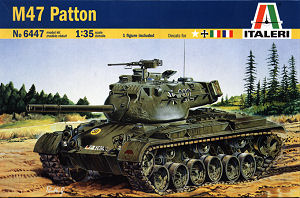
M47 Patton
Italeri Kit No. 6447
1:35th Scale
Review by Terry Ashley


The kit consists of 278 parts in olive drab plastic and a set of full length vinyl tracks plus the instruction sheet. The standard of moulding is very good and given the age of the kit is noticeably free of flash and pin marks although there are some fairly heavy mould seams to be removed especially on the suspension components but these are easily dealt with.
Lower Hull:
The lower hull tub is fairly plain with just the suspension mounting brackets
and forward round escape hatches on the angled lower sides and the upper
return roller mountings with all other components as separate parts. This
includes the axles, shock absorbers and connecting rods as well as the two
part final drive housing and four part drive sprocket with the inner guide
discs. Also separate are the axle bump stops and lifting eyes as well as
the wheels and return rollers having separate hubs for good definition and
about the only thing required is a number of bolt heads on the axle and shock
absorber attachments to finish what is a superbly detailed running gear even
by today’s standards.
Also notable is the rear inset with the upper half of the engine/transmission and associated batteries and bulkheads which will come up very well with careful painting and the addition of some plumbing to fill out the rear hull nicely.
Track:
As mentioned the vinyl T84E1 track is the usual full length of the day but
has very good details on both sides with the end connectors and central guide
teeth in the correct position between each link as well as small gaps between
each link and was ahead of its time when first released and again stands
up well by today’s standards.
Upper Hull:
The upper hull is in one piece including the fenders but has cut-outs for the
front crew hatches and most importantly has the six outer engine deck hatches
as separate parts with louver detail on both sides of the hatches and this
allows the engine insert to be displayed. The fit of the deck doors is excellent
and will hold in place without glue allowing you to choose the door position
easily.
The forward engine deck intake is also open at the front for good detail and the fender mounted exhausts are in two parts allowing the pipe to be hollow with a separate heat shield over the exhausts.
On the rear panel there is excellent definition on the three prominent round access hatches and the field telephone box has internal detail included with a separate hatch cover plus separate lifting eyes, towing hitch and taillight assemblies.
The engine deck barrel support is in two parts and is movable so you can easily position this raised or lowered and the separate fender storage boxes have additional separate grab handles and lid opening handles along with separate fender support turn buckles for excellent definition.
Towards the front are separate crew hatches with excellent hinge details included in the hull mouldings plus separate periscope guards although these are a little on the thick side plus internal detail on the hatches.
The front hull contours are very well done with a separate full hull .30cal machine gun plus separate light, and light guards and lifting eyes for excellent definition with just the light guards being a little on the thick side but should be easy to thin down a little.
The Turret:
The upper turret shell is in one piece with the lower turret ring separate
and the contours of the turret are captured very well with many separate
parts in keeping with the rest of the kit.
The 90mm gun comes complete with inner gun breech and has a choice of the three muzzle brakes used on M47s with the early M26 style, the tube type and later T style brake with the later two types being more appropriate for the vehicle version in the kit with a separate gun mantlet with lifting eyes included.
The loader’s hatch is a separate part with separate hatch springs and grab handle as well as interior detail and the Commander’s hatch also has separate workable hinges and grab handles as well as internal detail. The periscopes in front of the Commander’s cupola have separate covers and the two side mounted binocular sights are also separate parts as are all the lifting eyes and Loader’s periscope cover.
The storage racks along the sides are also separate as is the two part rear storage box and side mounted jerry cans with separate handles and filler caps and there is the pintle mounted .50cal machine gun with separate rear grip and ammo box.
About the only thing that hasn’t stood the test of time is the crew figure which does look thirty years old and is best not spoken of again.
Decals:
The sheet is nicely printed with markings for US, French, German and Italian
Army vehicles but the M47 was used by no fewer than 20 countries;
Austria, Belgium, Ethiopia, Former Federal Republic of Germany (FRG), France,
Greece, Iran, Italy, Japan, Jordan, Korea, Pakistan, Portugal, Saudi Arabia,
Spain, Switzerland, Taiwan, Turkey, Former Yugoslavia and U.S.A. for an almost
endless choice of paint schemes and marking choices.
Conclusion:
This kit is one of the best, if not the best kit ever produced by Italeri and
was a classic of it’s time and still stands up very well by today’s
standards with many separate fine detail parts and well defined details included
on the larger mouldings.
The fit of parts is very good making assembly trouble free overall and the level of detail will make for an excellent model OOB and it is very good to see this kit available again.
Highly recommended even after 30 years.
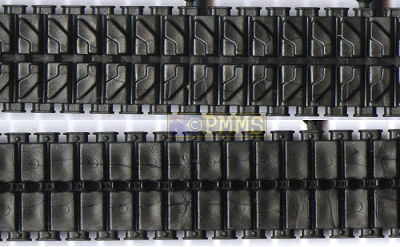
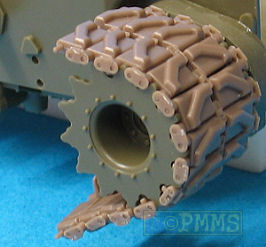
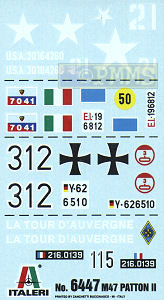







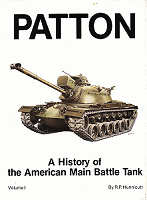 |
PATTON A History of the American Main Battle Tank Volume 1 By R.P.Hunnicut Published by Presidio Press ISBN 0-89141-230-1 |
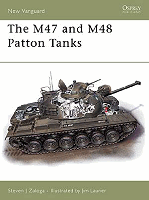 |
The M47 and M48 Patton Tanks New Vanguard 31 Osprey Publishing By Steven J Zaloga ISBN 1855328259 |
Page Created April 16, 2006